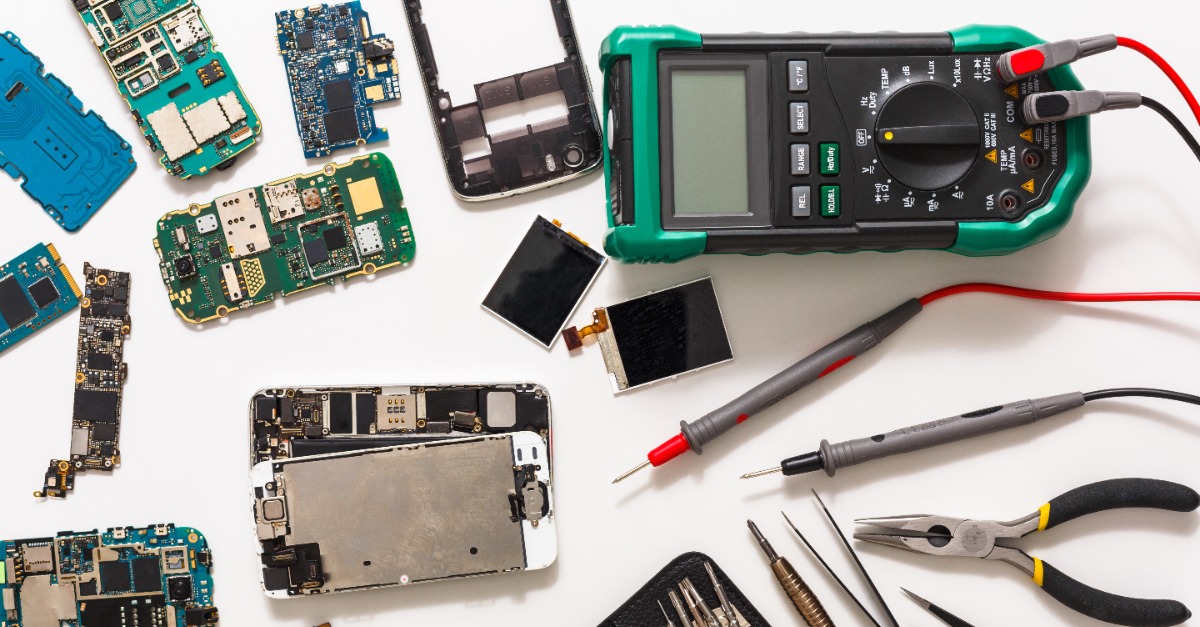“Right to Repair”: Digital Disparities

Timothy R. Primrose, Mobile Forensic Analyst
The phrase “Right to Repair” refers to any legislation concerning consumers’ rights to repair digital devices, ranging from cell phones to vehicles. This article explores the broader questions raised by the legal disputes and conflicting stakeholder views regarding the cellular and automotive industries, and the potential implications on Mobile Forensics and Collision Reconstruction processes.
Cell Phones
In regard to cell phones and devices such as tablets and laptops, the “Right to Repair” movement aims to counter the growing trend of manufacturers implementing repair-restrictive policies and measures. These policies can include proprietary screws, glued components, or software locks that prevent independent repairs.
Unauthorized repairs or modifications to a device can alter data or introduce potential errors. There is a limitation on technology parts available to consumers, repair technicians, and digital forensic investigators. Technology parts that are available to purchase may not be directly from the manufacturer, but from third party vendors. For instance, a replacement part for an Apple iPhone can be replicated and sold by a third-party company.
In the event that a cell phone or device containing digital evidence is damaged, whether accidentally or as an act of spoliation, repairs might be required to collect data from the device. In general, a phone needs a working screen, battery, and charging port in order to collect data from it. Depending on the model of the device and the extent of the damage, modifications may need to be made in order to collect data from the device. The goal in a forensic scenario is to obtain data from the device, with disregard to the device’s functionality following inspection. This is where the growing legal obstacles surrounding device repairs come into play.
Forensic investigators must follow a standardized repair protocol to preserves data integrity and protect privacy. Investigators can validate data collected from a damaged device by utilizing multiple software tools to analyze the data and conduct a side-by-side comparison, or even collect data from the phone with multiple software to look for differences in the data collected.
The mobile device side of the “Right to Repair” movement has successfully championed major manufacturers of mobile devices to seek compromise through self-repair kits. Mobile Forensic Analysts now have resources to complete inspections without compromising the validity of the data downloaded from a repaired device. Apple, Samsung, and Google now offer self service repair options that allow consumers to rent tools and recycle damaged parts.
Vehicles
Similar to mobile devices, the legal obstacles in repairing vehicles with digital components can have significant implications on post-crash forensic analysis. While the average car owner might not consider their vehicle as a digital device, today’s automotive industry is comprised of vehicles that are increasingly software-driven.
In 2020, Massachusetts voters overwhelmingly approved a ballot measure granting car owners the right to repair their own vehicles. However, Alliance for Automotive Innovation, representing global auto manufacturers, filed a lawsuit to prevent the law from going into effect. The dispute centers on whether state laws should supersede federal vehicle safety regulations and the potential safety risk associated with granting access to vehicle systems.
In the midst of this legal battle, the National Highway Traffic Safety Administration (NHTSA) recently warned automakers not to comply with Massachusetts three-year-old state law that mandates sharing vehicle data with owners and independent repair shops. NHTSA argues that granting such access could potentially make the vehicle systems vulnerable to hackers, compromising critical functions such as steering, acceleration, braking and electronic systems.
As a result of the unresolved issues, automakers such as Kia and Subaru have disabled telematic systems in newer models for sale in the state of Massachusetts. Not only does this disadvantage owners of these newer models in terms of safety features, but it also reduces the data sources frequently utilized in the collision reconstruction industry.
Portions of forensics analysis rely on access to the vehicle data to help with reconstruction events, determining liability, and establishing the root causes of events. Should automakers and independent owners or repair shops enter similar legal face-offs in other states, collision reconstructionists across the country will begin to face new obstacles in terms of collecting data from vehicles involved in a crash.
Categories: Collision Reconstruction | Industry Updates | Mobile Forensics | Timothy R. PrimroseTags: Data Download | Device Repair | Event Data Recorder | Infotainment | NHTSA | Telematics


